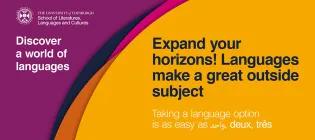Why study Spanish, Portuguese and Latin American Studies in Edinburgh?
The many countries in which Spanish or Portuguese are spoken have fascinatingly rich and varied cultures.
Studying one or both languages with us is your gateway to an extraordinary range of literature, film and theatre from Europe, Africa and the Americas, explored in its historical context, from medieval to contemporary times.
The University of Edinburgh is unique in Scotland in offering students a full academic year abroad within the four-year honours programme, regardless of whether you spend the year studying or working. If you are studying Spanish and Portuguese, or either one with another language, you will divide your time between two countries, broadening your skills and experience.
One of the most attractive characteristics of our degree is its flexibility. As well as lots of joint honours combinations, your first two (pre-honours) years will give you the option to study other subjects drawn from a broad list of disciplines. You can also opt to study Catalan and Basque.
On campus and in the city
We are based in the historic heart of a world-leading festival city, close to the National Library of Scotland and National Museum of Scotland.
The Main University Library is just across the square from us. Its collections include around 27,000 books and 5,000 journals in Spanish and 5,000 books and 2,680 journals in Portuguese.
The Spanish Society is one of around 300 societies and clubs supported by Edinburgh University Students' Association. Love to write? Our online creative writing magazine Babble is the place to publish your work and meet other writers in European languages.
In addition to the summer and winter festivals, Edinburgh has a lively year-round contemporary cultural scene. Its world cinema scene is particularly strong, and we are proud to contribute to this success through collaborations with festivals such as IberoDocs.
Spain has a consulate in Edinburgh (Portugal an honorary consulate), and there are large communities of Spanish and Portuguese speakers.



